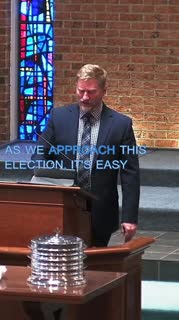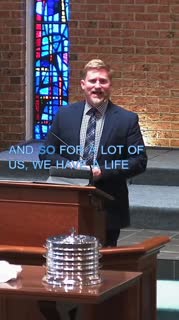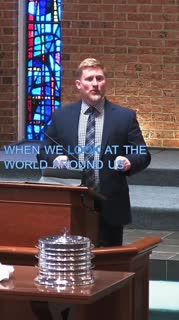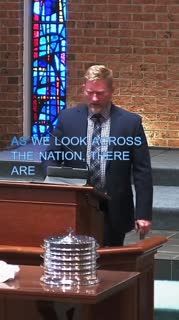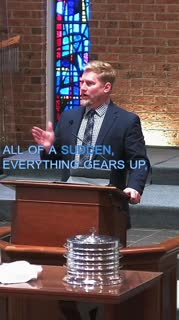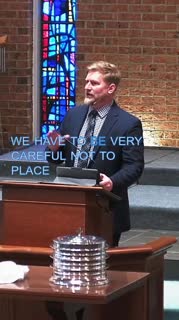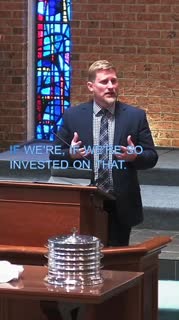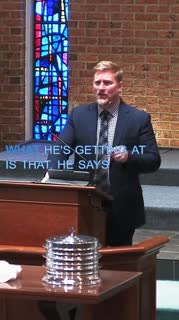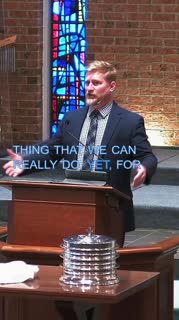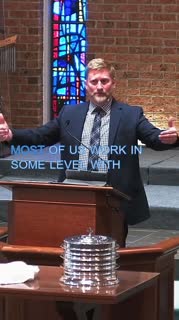Trusting God's Sovereignty Amid Political Uncertainty
Summary
In today's gathering, we explored the profound truth of God's sovereignty, especially in the context of political uncertainty and the upcoming election season. We began by reflecting on the Westminster Larger Catechism, which reminds us of Christ's rule over all things, including earthly governments. This serves as a powerful reminder that our ultimate hope should not rest in political leaders or outcomes but in God alone, who orchestrates all things for His glory and our good.
As we approach the election, it's crucial to remember that God is the one who establishes and removes leaders according to His will. Our role is to engage in civic life with wisdom and integrity, voting according to God's word rather than fear. We must guard our hearts against placing ultimate hope in political powers, recognizing that salvation and true peace come only through Christ.
Psalm 46 was a focal point of our reflection, emphasizing that God is our refuge and strength, a very present help in trouble. Even when the world seems to be in chaos, we are called to be still and know that He is God. This psalm reassures us that God is in control of every outcome, and we can trust Him without fear or anxiety.
We also discussed the importance of gratitude, even in uncertain times. God is not detached from our circumstances; He is actively involved in our lives, guiding and protecting us. Our gratitude flows from the assurance that God is sovereign over every outcome, and we can trust Him completely.
As we concluded, we were reminded of the importance of examining our hearts and confessing our faults as we come to the communion table. This act of faith reaffirms our trust in God's sovereignty and our commitment to live according to His will.
Key Takeaways:
- God's Sovereignty Over Earthly Rulers: God establishes and removes leaders according to His will, using governments to fulfill His purposes. Our hope should not rest in political outcomes but in God's sovereign rule. [27:58]
- Trusting God Amidst Political Uncertainty: As we approach elections, we must engage with wisdom and integrity, voting according to God's word rather than fear. Our ultimate hope is in Christ, not political powers. [29:39]
- Psalm 46: A Call to Trust and Be Still: Psalm 46 reminds us that God is our refuge and strength, a very present help in trouble. We are called to be still and know that He is God, trusting Him in every circumstance. [01:00:31]
- Gratitude in Uncertain Times: Even in chaos, we can be grateful for God's active involvement in our lives. He is our refuge, guiding and protecting us, and we can trust Him completely. [01:13:46]
- Examining Our Hearts in Faith: As we come to the communion table, we are reminded to examine our hearts and confess our faults, reaffirming our trust in God's sovereignty and our commitment to His will. [01:15:50]
Youtube Chapters:
- [00:00] - Welcome
- [27:58] - Christ's Rule Over All
- [29:39] - Engaging in Civic Life
- [31:30] - Great is Thy Faithfulness
- [35:06] - Children's Dismissal and Announcements
- [41:26] - Upcoming Events
- [43:08] - Introduction to Psalm 46
- [45:15] - Responding to Election Outcomes
- [46:36] - Trusting God in Political Seasons
- [49:49] - Anxiety and Trust
- [52:19] - God's Sovereignty in History
- [01:00:31] - Psalm 46: Trust and Refuge
- [01:02:46] - The Holy Spirit's Comfort
- [01:05:10] - Be Still and Know
- [01:13:46] - Gratitude and Sovereignty
- [01:15:50] - Communion and Confession
Study Guide
Bible Study Discussion Guide
Bible Reading:
- Psalm 46
- Daniel 2:21
- Romans 13:1
---
Observation Questions:
1. According to Psalm 46, what imagery is used to describe God's protection and presence during times of trouble? How does this imagery help convey the message of God's sovereignty?
2. In the sermon, how is God's sovereignty over earthly rulers described? What role does God play in establishing and removing leaders? [27:58]
3. What does the sermon suggest about the relationship between anxiety and where we place our hope? How does this relate to the upcoming election season? [49:49]
4. How does the sermon use the example of the Babylonian Empire to illustrate God's sovereignty and purpose in history? [52:19]
---
Interpretation Questions:
1. How does Psalm 46 encourage believers to respond to chaos and uncertainty in the world? What does it mean to "be still and know that I am God"?
2. The sermon mentions that God uses governments to fulfill His purposes. How might this understanding affect a believer's perspective on political engagement and voting? [29:39]
3. In what ways does the sermon suggest that gratitude can be cultivated even in times of political or personal uncertainty? How does this relate to the concept of God's active involvement in our lives? [01:13:46]
4. How does the sermon interpret the role of the Holy Spirit as a comforter in the midst of life's challenges? What significance does this have for believers facing difficult circumstances? [01:02:46]
---
Application Questions:
1. Reflect on a time when you felt anxious about a political or personal situation. How might the message of Psalm 46 help you find peace in similar situations in the future? [01:00:31]
2. As the election approaches, how can you ensure that your hope remains in God rather than in political outcomes? What practical steps can you take to engage in civic life with wisdom and integrity? [29:39]
3. Consider the role of gratitude in your life. How can you cultivate a heart of gratitude even when circumstances are uncertain or challenging? What specific practices might help you focus on God's sovereignty and goodness? [01:13:46]
4. The sermon encourages believers to examine their hearts and confess their faults. How can you incorporate regular self-examination and confession into your spiritual routine? What impact might this have on your relationship with God? [01:15:50]
5. Think about a current situation where you feel out of control. How can you apply the principle of "being still" and trusting in God's sovereignty to this situation? What might change in your perspective or actions as a result? [01:05:10]
6. How can you actively seek to be a source of peace and unity within your community, especially during divisive times? What specific actions can you take to reflect Christ's love and truth to those around you? [29:39]
7. Identify one area of your life where you struggle to trust God's sovereignty. What steps can you take this week to surrender that area to Him and rely on His guidance and protection? [52:19]
Devotional
Day 1: God's Sovereignty in Leadership
In times of political uncertainty, it is essential to remember that God is sovereign over all earthly rulers. He establishes and removes leaders according to His divine will, using governments to fulfill His purposes. This understanding should shift our hope from political outcomes to God's sovereign rule. As we navigate the complexities of political seasons, we are reminded that our ultimate allegiance is to God, who orchestrates all things for His glory and our good. This perspective encourages us to engage in civic life with wisdom and integrity, trusting that God is in control of every situation. [27:58]
Daniel 2:21 (ESV): "He changes times and seasons; he removes kings and sets up kings; he gives wisdom to the wise and knowledge to those who have understanding."
Reflection: In what ways can you actively trust God's sovereignty over political leaders in your daily conversations and actions this week?
Day 2: Engaging with Integrity
As elections approach, it is crucial to engage in civic life with wisdom and integrity, voting according to God's word rather than fear. Our ultimate hope should be in Christ, not in political powers or outcomes. This mindset helps us to navigate political seasons without anxiety, knowing that God is the one who establishes and removes leaders according to His will. By focusing on God's word, we can make informed decisions that align with our faith, ensuring that our actions reflect our trust in God's sovereign plan. [29:39]
Proverbs 3:5-6 (ESV): "Trust in the Lord with all your heart, and do not lean on your own understanding. In all your ways acknowledge him, and he will make straight your paths."
Reflection: How can you ensure that your political engagement is guided by faith rather than fear this election season?
Day 3: Finding Refuge in God
Psalm 46 serves as a powerful reminder that God is our refuge and strength, a very present help in trouble. Even when the world seems chaotic, we are called to be still and know that He is God. This psalm reassures us that God is in control of every outcome, and we can trust Him without fear or anxiety. By finding refuge in God, we can experience peace and stability, even amidst uncertainty. This trust in God's sovereignty allows us to face challenges with confidence, knowing that He is our ultimate source of strength and protection. [01:00:31]
Isaiah 26:3-4 (ESV): "You keep him in perfect peace whose mind is stayed on you, because he trusts in you. Trust in the Lord forever, for the Lord God is an everlasting rock."
Reflection: What specific steps can you take to cultivate stillness and trust in God during times of personal or global uncertainty?
Day 4: Gratitude in Chaos
Even in chaotic times, we can be grateful for God's active involvement in our lives. He is our refuge, guiding and protecting us, and we can trust Him completely. This gratitude flows from the assurance that God is sovereign over every outcome, and His presence is constant in our lives. By focusing on gratitude, we can shift our perspective from fear to faith, recognizing God's hand in every situation. This attitude of thankfulness helps us to see beyond our circumstances and trust in God's perfect plan for our lives. [01:13:46]
1 Thessalonians 5:16-18 (ESV): "Rejoice always, pray without ceasing, give thanks in all circumstances; for this is the will of God in Christ Jesus for you."
Reflection: How can you practice gratitude today, even in the midst of uncertainty or difficulty?
Day 5: Examining Our Hearts
As we come to the communion table, we are reminded to examine our hearts and confess our faults, reaffirming our trust in God's sovereignty and our commitment to His will. This act of faith encourages us to reflect on our relationship with God, ensuring that our hearts are aligned with His purposes. By examining our hearts, we can identify areas where we need to grow and seek God's guidance in our spiritual journey. This process of self-reflection and confession strengthens our faith and deepens our trust in God's sovereign plan for our lives. [01:15:50]
Psalm 139:23-24 (ESV): "Search me, O God, and know my heart! Try me and know my thoughts! And see if there be any grievous way in me, and lead me in the way everlasting."
Reflection: What specific areas of your life do you need to examine and bring before God in confession and prayer today?
Quotes
1. "As we approach this election, it's easy to place our hope in what happens at the polls. But the truth is, our hope is not meant to be placed on what happens in elections, what those outcomes might be. That doesn't mean that we don't participate. In fact, most of us that are in here participate in government, participate with elected officials. Most of us in here have some kind of overlap in our life, whether in our careers or with family members who have careers, who are deeply involved with what happens in Washington DC. We are a suburb of Washington CC." ([00:45:53] (39 seconds)
)
2. "And so for a lot of us, we have a life that's participating in what's going on in the world around us, what's going on in DC. And so for a lot of us, we may work for specific candidates. We may work for red candidates, we may work for blue candidates, we may work for conservative ideas or others. And so on and so forth. That's all that matters. It's a matter of what you can We may work for liberal ideas. We may work for everything in between. But the reality is, and the question is, when things don't go our way, how are we going to respond?" ([00:46:36] (32 seconds)
)
3. "When we look at the world around us right now, what's going on, you know, if you live in Pennsylvania or if you live in North Carolina or one of these states that have a lot of implications on who's going to be elected, I can't even imagine being in that location right now. Constant bombardment of, you know, of the different candidates, the different ideas. But the question is, how are we going to respond on Wednesday when things don't go the way that we would like them to go, whether you're a red candidate or a blue candidate?" ([00:47:28] (31 seconds)
)
4. "As we look across the nation, there are going to be people who wake up on Wednesday morning with a sense of relief or a sense of grief, right? There are going to be people who feel like what happens on Tuesday night is going to have implications that are going to be catastrophic to the world, to our nation, to us personally, or are going to feel a sense of adulation and excitement, thinking that what's going to happen on Tuesday is going to be the answer to all of our problems. I'm going to tell you what, I've been living here for quite a while now, you know, I'm in that 50 range, won't get specific, I'm in that 50 range, and you know what? My whole life. I've heard the same thing, that whoever wins, you know, if the wrong person wins, it's going to be catastrophic. And if the right person wins, then everything's going to be perfect and the world's answers will be solved. And the reality is, is that come Wednesday, what happens?" ([00:47:59] (63 seconds)
)
5. "All of a sudden, everything gears up, telling us the same exact thing, gearing up for the next four years. I mean, it's not, you know, we think that, we think that Christmas in October during Halloween is bad, but when it comes to the election cycle, sometimes it starts the day after the election. You know, and I really feel sad about that. I really feel burdened by the fact that, you know, there are a lot of people have a lot of vested interest in having us as a nation divided and against each other, and the reality is that is not what God has called us to." ([00:49:22] (39 seconds)
)
6. "We have to be very careful not to place our trust in God. We have to place our hope and our trust in what happens on Wednesday, what happens on Tuesday and the outcome on Wednesday. You know, we talk about people who have a sense of grief or a sense of relief, but the reality is, is that either way, if we walk away with such a burden of anxiety or depression, you've heard about that, elections have caused people to go into severe depression." ([00:49:60] (29 seconds)
)
7. "If we're, if we're so invested on that. If we're so invested on that level as brothers and sisters in Christ, as followers of Jesus, we really have to examine who we are and where we are, because here's the reality about anxiety. Dallas Willard, who is a highly influential Christian philosopher, he is a professor at University of Southern California, a deeply committed Christian. This is what he says about anxiety. He says that anxiety is fundamentally a matter of what we place our heart upon." ([00:50:29] (32 seconds)
)
8. "What he's getting at is that. He says that if we place our hearts on the wrong things, then yes, we will begin to feel anxious. When we put our hearts on things that are outside of our control, we're going to get anxious if we're placing them on the wrong thing. There are a lot of things in this world that we cannot control. I mean, the reality is, is that most of us, the most influential thing that we're going to come, that we're going to be able to do when it comes to Tuesday is vote. And then we have to wait another four years to vote. That's the only thing." ([00:50:21] (31 seconds)
)
9. "thing that we can really do. Yet, for many people in our nation, they sit in anxiety for four years hoping that that next election will turn out the right way, and then they go for another season of anxiety. The problem is, is that we put our hope and our trust in the wrong things. Now, don't hear what I'm not saying. We all, as I mentioned, most of us in here have a vested interest in what's going on in Washington." ([00:51:36] (28 seconds)
)
10. "Most of us work in some level with what's going on in Washington, and I'm not saying that we don't participate. In fact, I strongly encourage that. I believe that God uses secondary means and ordinary causes to produce his sovereign will, and what I mean by that is that God could instantly snap his fingers and choose for things to turn out a certain way, but he doesn't do that. He includes humanity in the world. In the process of seeing through to his will. He does that on a national level. He does that through our families. He does that in evangelism. You see, God could snap his fingers and have people turn their hearts to him just like that, but he doesn't do that. He says that you only come to faith through hearing of the word, and if there's nobody to speak the word, how can we hear? Right? So he uses humanity to see his will come to pass, and it's the same thing when it comes to things like that. Things like elections." ([00:52:19] (60 seconds)
)
